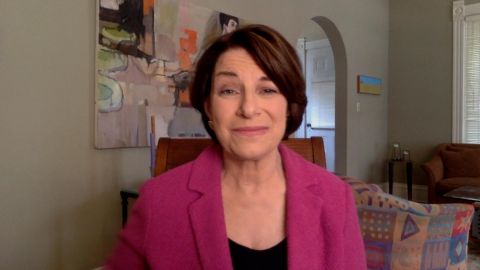Read Transcript EXPAND
CHRISTIANE AMANPOUR: Now, the sort of inside out version of current affairs with bestselling author and host of the “Revisionist History Podcast,” Malcolm Gladwell. His latest book, “The Bomber Mafia,” explores new details about the bombing of Tokyo during World War II. Here’s Walter Isaacson speaking to him about the technological innovation and moral conundrums that scientists and generals wrestled with at the time.
(BEGIN VIDEOTAPE)
WALTER ISAACSON: Thank you, Christiane. And Malcolm Gladwell, welcome back to the show.
MALCOLM GLADWELL, AUTHOR, “THE BOMBER MAFIA”: Thank you, Walter.
ISAACSON: Your new book, “The Bomber Mafia,” is just terrific. It’s a wonderful narrative. But start by explaining to us who were the Bomber Mafia?
GLADWELL: The Bomber Mafia were a small band of renegade pilots in Central Alabama in the 1930s who fell in love with bombers and with the potential of the bomber, which was kind of invention of that era to revolutionize warfare. And they bring this kind of outrageous set of idealistic notions about how you can fight a war without leaving millions of people dead. They bring that into the Second World War. And my book is all about the story of how this kind of dream meets reality when we actually go to war in the 1940s.
ISAACSON: And you said that it was a tale that connected with your own personal obsessions, you know, growing up in England, hearing about the blitz.
GLADWELL: Well, my — you know, my father grew up in Kent, south of London, which was known as “Bomb Alley.” It was — when the German bombers flew in to — from Germany to London to bomb London during the blitz, they flew over my father’s little town called Sevenoaks. And as a child, he would hide under the bed, he would be instructed to sleep under his bed. That’s his — that was their idea of safety back then. And at one point, even a German bomb landed in my grandparent’s backyard. And so — it didn’t explode, thankfully. So, I grew up with my father was of that generation where the Second World War loomed large in his imagination. And I grew up on these stories of, you know, hearing the German bombers overhead and, you know, picking strawberries with my grandmother one day and all of a sudden, a bomb attack happens and they have to hide out in some forest. I mean, that was my father’s childhood. So, I’ve been — you know, the way you carry these things with you your whole life and then I finally got a chance to tell a story about that era.
ISAACSON: And the bombing in England then was the blitz. It was just area bombing. The Germans were trying the demoralize England during the war. But your book is about precision bombing. How did that come to be?
GLADWELL: So, the way you bombed in the 30s and early 40s was the physics problem of trying to drop a bomb with any degree of accuracy was so overwhelming that people just didn’t even try. So, you if think about it, you’re flying a plane six miles in the air at 200 some odd miles an hour and you’re trying to drop a relatively small bomb to hit target on the ground that might be quite small itself. That — doing that with any degree of accuracy at that point in history was basically impossible. So, most air forces just gave up and they just said, you know what we’ll do is we’ll just drop hundreds of bombs and hope something comes close. We’ll just destroy anything we can, right. The bar mafia were convinced they could solve the physics problem. So, they thought, oh, actually, we think we can target a bridge or an aqueduct or a powerplant and actually hit it from 20,000 feet. And they said, as a result, because we think we can achieve accuracy, we don’t have to do this kind of wholesale area bombing that was very much the vogue of the moment. We can do — we can conduct war on a much more humane and precise and surgical basis. That was the dream they had.
ISAACSON: And they wanted to do that for moral reasons after World War I slaughter of millions of people or was it because there was a better way to win a war?
GLADWELL: It was both, but I think it was really moral reasons. I mean, you know, anyone who emerged in the generation after the First World War was so chasten (ph) and traumatized by the wholesale slaughter and stupidity of that conflict, but they were determined not to repeat it. And the Bomber Mafia were a group of people who I really think — one of the reasons that I find themselves fascinating is they are technologists, they’re innovators but their primary driver is moral. I mean, it’s as if Mark Zuckerberg went to seminary before he started Facebook. I mean, that’s the kind of way to understand these men. They were all men. They really, really, really wanted to find a way to fight a war without destroying half of Europe and without obliterating an entire generation.
ISAACSON: And the technology was a guy named Carl Norden, who, in your book, sounds really weird, but he’s able to invent a piece of technology that could enable this, right?
GLADWELL: Norden is this crazy Dutch engineer who invents an analog computer in the 1930s. You know, a kind of 55-pound mechanical device with pulleys and gyroscopes and all manner of like and he feeds all these, you know, with knobs and levers and his idea is that you enter in every possible variable that would make a difference in a trajectory of a bomb. And you entered into this analog computer and it will tell you when to release the bomb. And having produced this thing, an enormous cost by the way, the U.S. military spends — the only thing they spend more on over the Second — in the Second World War is the Manhattan Project and the B-29 Bomber. This is the third most expensive project of the war, building these little 55-pound analog computers. They put one of these in every plane, every bomber that flies over Japan and Europe has one of these devices in it with someone who — a bombardier who spent six months training how to use it. And the idea was that this device will allow us to forego all of this crazy carpet bombing that everyone else was doing and just go in over Berlin, take out the Reichsta, a couple of power plants and the railway station and then the Germans will be done. That was the idea.
ISAACSON: And there are two characters in your book who represent the polar opposites in this philosophy. So, let’s start with Haywood Hansell.
GLADWELL: Haywood Hansel is part of a long line of southern military gentleman. You know, his forebears fought in the Revolutionary War and then were generals and in the Civil War on the Confederate side. And he is that kind of, you know, southern romantic intellectual. He writes poetry. Hesings Broadway tunes to his men when he — as he’s flying back, you know, over a bombing run over Europe. His favorite novel is Don Quixote and he identifies with, you know, the knight who — the gallant knight who tilts at windmills. He — and he thinks of the — he thinks of what he’s trying to do with the Bomber Mafia is part of a grand and moral crusade to reform war, and that’s his principal motivation. His great antagonists Curtis LeMay and Curtis LeMay is the antithesis of Hansel. He is a kind of working-class kid from Columbus Ohio with — looks like a bulldog with a big square head and a cigar in his mouth. A man of almost — to say he’s a man of few words, I think is an overstatement. And he is the most unsentimental bloodthirsty ruthless ferocious warrior perhaps of any on the allied side during the Second World War. And he is a brilliant, an absolutely brilliant aviator, one of the great aviators of his generation. But he finds everything Haywood Hansel stands for, be — I, mean ludicrous does not quite describe LeMay’s attitude. He looks on what Haywood Hansel is peddling with complete contempt.
ISAACSON: And so, Curtis LeMay believes in the carpet-bombing strategy, of just bombing, as of one point, he’s quoted to saying about Vietnam back to the Stone Age if we’re going to win a war. When did — and so, I assumed, as I started reading this book, that he’s going to be the villain in the book. When did you get into the revisionist history mindset to think maybe he’s not the villain?
GLADWELL: Well, you know, I didn’t want to write a book with villains and heroes because if you — I think — particularly in a period of history as complicated as this one, you can’t pick a villain and a hero. You — I think you have to acknowledge the insanely complicated decisions and circumstances that everyone involved faced. And you have to respect the path that led to their decisions. And much as I — part of me is filled with revulsion at Curtis LeMay. Curtis LeMay was — you know, there’s a point in the book when I list the people in the 20th century who killed the most civilians, responsible for the deaths of the most civilians. Stalin is at one. Mao is a two. Hitler is three. Pol Pot is four. And Curtis LeMay is 5. Curtis LeMay — I mean, he’s in the pantheon of the most, you know, horrendous mass murderers in history. In the Summer of 1945, he threw his — he launches a fire-bombing campaign over Japan that results in the deaths — result in burning to death someone close to a million Japanese civilians. And yet, you can make an argument, a compelling argument that he had no choice and that by virtue of this attack, the end of the war was sufficiently accelerated that we avoided a much worse calamity.
ISAACSON: Now, before he’s in charge of the air campaign over Japan Haywood Hansel is. And he tries his approach first. Why didn’t — why wasn’t that better, a precision bombing campaign?
GLADWELL: The Bomber Mafia, as so many innovators do, had a kind of idealized notion of how their technology would be used in real life. Japan had something that no one in have period was aware of, which was they had the jet stream, which was we now are very familiar with this, but a metrological phenomenon then unknown which was that once you get up to 20,000 feet at certain points of the year, over many parts of the world but particularly Japan, there are winds blowing at 200 plus miles an hour. Now, try and drop a bomb with any accuracy of a plane when it’s being blown sideways at 20 miles an hour, it’s impossible. So, Hansel tries this strategy over and over again in the fall of 1944. He tries to do this humane surgical precision bombing of Japan and he doesn’t hit anything. And finally, the brass back in Washington threw out their hands and say, this – – it’s it. That’s it. We’re done with this experiment. We’re going to go back and do it the old brutal way. And they bring in Curtis LeMay.
ISAACSON: And so, they bring in Curtis LeMay, they decide to do it in the old brutal way and they’ve invented something called napalm. Explain how that was years over the wooden houses of Tokyo.
GLADWELL: Napalm — we always think about napalm in connection with the Vietnam War. But, in fact, was used, first of all, very liberally in Korean War but even more so, it was used in a Second World War. It was designed in a chemistry lab at Harvard University in the early 1940s with the explicit purpose of burning down Japanese houses. So, Japanese cities in those — in that era were — the houses were almost all made out of wood and tar paper and they were very close together and the roads are very, very narrow and so the cities were tinderboxes. It was quite different, by the way, than European cities of that era, which were bricks and mortar, stone with lots of parks and wide streets, very hard to burn that kind of thing down. And it had never really been used on a grand scale until Curtis LeMay decides to deploy it at unimaginable levels over Japan in the spring and summer of ’45. And he drops tons of napalm on 66 Japanese cities and burns, like I said, close to a million Japanese civilians alive over the course of that summer.
ISAACSON: It’s the most brutal scene of any book I’ve read in a long time. The longest night of the war, the napalm bombing, the firebombing of all these cities, it caused me to be — you know, I was revolted by it. But behind me, you can see my cabinet here, a picture of my father that spring when he and six friends from Tulane enlisted because they joined the Navy right then so that wouldn’t miss World War II. I realized after I was repulsed by that chapter that had that not happened, maybe my father would have had to be part of the landing in Japan. So, how do we morally sort this out?
GLADWELL: I don’t know if we can, Walter. I mean, what you’re describing is the calculus that was made at the time, it has been made ever since, which was we need to bring the Japanese to the point of capitulation. And we had several options. One was to burn their cities down with napalm. The other option was, in November of 1945, to launch a ground invasion. Would a ground invasion have been a bloodier scenario than bombing them from the skies? Most people think yes. Most people think that your father and his friends would probably have perished in a ground invasion of Japan. It would have been a bloodbath. God knows how many American soldiers would have died in that and how many Japanese soldiers would have died and Japanese civilians, not to mention, you know, the plan was to blockade Japan. So, you’re looking at God knows how many hundreds of thousands or millions of people dying of starvation. So, what we were trying to do is overt what was believed to be a far greater nightmare, which is a prolonged endgame in Japan into 1946. And I find the logic of that persuasive. In other words, I think we were probably correct to keep your father out of that stage of the war.
ISAACSON: All of your books, all of your podcasts, all of your vision is history’s a very good narrative. But also at the end, I realized there are parables. They’re about something a little bit larger. This book seems to be a parable for technology, right?
GLADWELL: I thought the story was very contemporary in a sense of what the Bomber Mafia were going through was what we now go through all the time, which was a group of people were possessed of a very, very disruptive innovation and they had a dream about how it should be used in the world. And then it didn’t quite work out the way they hoped. You know, I can give a million examples. You know, there was a moment, I remember, 10 years ago when we were convinced that Twitter was going to be an agent of democratic reform in the Middle East. I mean, honest, serious people were going around saying Twitter is going to bring democracy to this land of tyrants. I mean, couldn’t anything in retrospect seem more absurd? But that’s what we believe because we’re in that moment. So, what — this is this story is a kind of dress rehearsal for what will go on over the next 100 years
ISAACSON: Malcolm Gladwell, thank you for joining us.
GLADWELL: Thank you, Walter.
About This Episode EXPAND
Amy Klobuchar; Rana Ayyub; Amanda Bennett; Malcolm Gladwell
LEARN MORE


